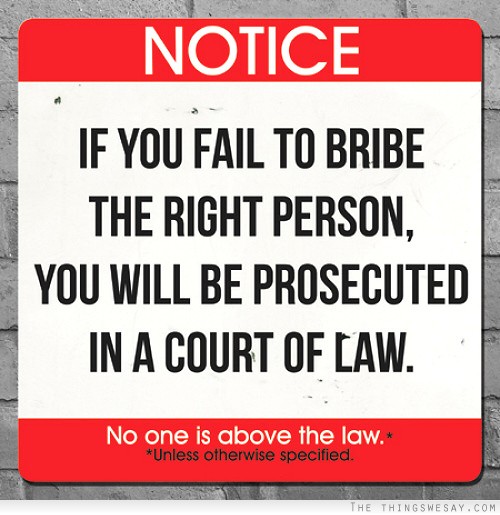
|
If we desire respect for the law, we must first make the law respectable
An essential feature of authoritarian and dictatorial regimes is that the entire body of law is designed to make almost everyone an outlaw in some respect. This allows selective enforcement to give the appearance of the rule of law, but it actually allows any person or organization to be prosecuted or persecuted at the whim of a government official. Further, when the rule of law is so disrespected, there is a flight of capital and productive people to societies that have a greater respect for the rule of law. The body of American law (U.S. and Massachusetts) is now so massive, so contradictory and so vague that selective enforcement can hardly be avoided. Antitrust law stands as a poster child for such lawlessness but it is hardly unique in that respect. There is only one check on the lawless trend of our governments - the American and Massachusetts voters. If voters understand that the rule of law is rapidly deteriorating in the U.S. and Massachusetts and the individual freedom and prosperity they stand to lose by allowing it to continue, they can put a stop to it by supporting politicians who clearly and unambiguously respect the rule of law. Otherwise, the U.S. will continue its gradual but accelerating descent into authoritarian rule and deteriorating prosperity. The right to read the law - and just as important, the right to copy, discuss, and share the law is essential to the rule of law itself. No one owns the law. We all own the law. Copyright cannot trump the essential public interest in accessing and sharing the law. If we must all abide by the law, then we must all have the ability to access it freely, without fees or restrictions.

Intention to commit a crime In four decades, the size of government has grown to create regulatory and criminal systems that can ensnare innocent people who have no intent of breaking any laws.
The first step in commiting a crime is to have an intent to commit a crime. If there was no intent, it is not a crime.
For a crime to exist, there must be an injured party. Who is the injured party? And what is and where is the evidence or nature of the injury?
A crime requires a victim. Unless you can produce a victim, then by definition you have no crime. Of course, none of this is to say that she won't be convicted, as I'm sure the prosecution will have no problem dredging up 6 to 12 dead-eyed sheep jurors who are perfectly willing to rubber-stamp the conviction so that you can get home in time for Dancing With The Stars.
Ignorance of the law is no excuse How many laws have been passed in 300 years. Where are all these laws? No one really knows. Ask a judge, a DA or a lawyer. Watch them cringe. If only every government at every level could provide us with an updated list of laws each year. The list would take us years to read and each and every law would be really ambiguous. Some laws would be many pages in length. Have you ever asked yourself where they hide all these laws? Why are they so well hidden. Shouldn't law books be available on line for everybody to see? In four decades, the size of government has grown to create regulatory and criminal systems that can ensnare innocent people who have no intent of breaking any laws.
The worst part is that it's next to impossible to get rid of old
laws that cannot be enforced. Why do the courts continue to criminalize
blasphemy
,
fornicating
, and
adultery
.
One would think that at the end of the year, we would see a web site somewhere in their realm that examines all the new laws added for the year, and which were removed. We don't and we won't.
There's a good reason why, in the 4th Amendment, suspicion of wrongdoing comes before search. And it's not only because of the presumption that we should generally be left alone - but because of the danger that a government, with enough data about any of us, and enough laws, can find some basis for being suspicious. Show me the man, and I will show you the crime, said Stalin's secret police chief.
Given the choice of having someone read your mind or read your phone, if you seriously think about it, you'd probably pick the former. Compared to what's in your phone, your brain holds a tiny amount of information, much of it wrong, all of it lossy. It's easy to forget what kind of embarrassment your phone contains. Because it has so much you can't even remember. As you discover whn someone flips through a bunch of photos you thought were safe. But suddenly discover aren't. And while the phone is an extension of the self. we all know where this is going. A computer chip in your skull will eventually be as quasi-mandatory as a phone is today, and avoiding one will make you seem Amish. If we don't protect our most intimate digital devices as part of the self legally, we are going to be in some scary places in the future. Because the law is a complicated brick structure of individual laws each resting on what came before. This is why you hear lawyers argue based on laws from three hundred years ago. That's not by insanity, but by design. And it's why people freak out over court cases that lay down a new brick in a new area. It's not about this brick. It's about what will, inevitably be built on top of it. To argue, "Don't worry, this law is just for this case, this time", is to argue against what the law is. Like a chess player saying to his opponent, "This move isn't about future moves." That's not how this works. That's not how any of this works. Three hundred years ago someone writes a law about papers in your house. At the time when papers and books were luxury items and half the population, illiterate, and then it's applied to millions of intangible files on your phone. While, in aggregate, record every detail of your life. Maybe you think that's good. Maybe you don't. But either way, the modern law is built atop the old. And it's wy people are right to be concerned about each precedent setting law, and why the "slippery slope fallacy" does not apply here. Thinking about today's law is thinking about future law and access to your phone today, is unavoidably, about access to your mind tomorrow.
It is more accurate to mention that the reason laws are built atop one another is NOT just because thats how it works, but because a court deciding today's case will make use of the reasoning and discourse in a previous related case. Assuming the court today is on the same hierarchical tier, the previous case is not binding. Basically the court says "Hmm this is a tricky issue, it will take me a long time to think fully on the matter. I can cut this time down drastically by starting at what was until today considered the end of the matter" We don't follow precedents just 'cause. We examine previous reasoning, apply it to the current context, and examine whether or not the conclusion reached should be the same given the differences in the case and in society today. Although this places significantly more weight on the highest courts in the land getting their decisions right. Legislation however, is not built upon other laws. Its more like an etchasketch, except you can erase parts of the image or the whole or just add to it (and then its the courts job to tell us whether its a train or a bus or a guy surfing). The only way legislation is built atop older laws is through complacency or a desire to extend rather than repeal.
Justice in the US is based on a system of common law. In common law systems:
Common law systems go back to the legal systems that developed in medieval England. Before the invasion of William the Conqueror in 1066, England had no centralized legal system. Judges acted independently according to regional traditions, and these traditions were kept by following generations. Precedent Common law systems rely on the principle of precedent, which means that if a court has already made a legal decision about an issue, judges must respect that decision in later rulings. Judges can only apply a different ruling if a) they can demonstrate that the issue is somehow different from the precedent, or b) they belong to a higher court than that which gave the original ruling. This means that the hierarchy of courts in the legal system is important. The US Supreme Court, for example, is the highest court in the country: any decisions it makes 'binds' all other courts in the country, who have to follow these decisions. When it ruled in 1973 that the 14th Amendment, which guarantees people's privacy, should be interpreted as guaranteeing a woman's right to abortion, this meant that no other court could rule that a woman didn't have a right to abortion (and, because the Supreme Court is the ultimate interpreter of the Constitution, no legislative body could pass a law against a woman's right to an abortion). This decision can only be changed by the Supreme Court itself.
The U.S. Constitution is the supreme law of the land. See if you can find the term immunity. The concept of immunity can only be granted to others by those who have already been given immunity by others. Immunity is like Holy Water. Once you are consecrated, you may use Holy Water to consecrate others to protect them from an imaginary god or the law.
|
Send comments to:
 hjw2001@gmail.com
hjw2001@gmail.com
|



